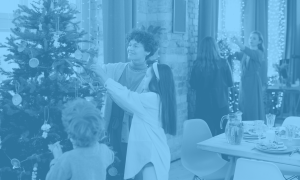
February Focus: From Scattered to Steady
Have the January blues finally eased a little? Did you set any New Year’s resolutions? If the answer is yes, there’s a
This week is Learning Disability Week, and this year’s powerful theme “Do You See Me?” invites all of us to pause, reflect, and ask ourselves this question…
Are we truly seeing, hearing, and valuing the people around us – especially those with learning disabilities?
For many, learning disabilities can be invisible. They’re not always obvious at first glance, and that’s exactly why this week is so important. It’s a time to recognise that visibility isn’t just about what we see; it’s about truly understanding, respecting, and supporting one another, especially when someone’s struggles may not be obvious to the naked eye.
As someone who lives with several hidden disabilities following a brain injury, I know firsthand how vital it is for my own mental wellbeing that people not only acknowledge what I go through, but make an effort to understand it. When someone takes the time to listen, support, and treat me with patience and empathy, it makes the world of difference. It helps me to feel seen, heard and valued, and that’s what every single person deserves.
A learning disability affects the way a person understands information and how they communicate. It can impact reading, writing, attention, memory, social interaction, or physical coordination. Some examples include:
Everyone with a learning disability is different and no two experiences are alike, so a “one-size-fits-all” approach just doesn’t work. We need to be open to learning from each person individually, not just about their diagnosis, but about how they want to be supported.
For people with learning disabilities, these three things are often denied (sometimes unintentionally), but the impact is huge. They might be underestimated, spoken over, excluded from decisions, or misjudged because their struggles aren’t visible. That isolation can be disheartening and very damaging to that individual.
This is why Learning Disability Week is not just for people with learning disabilities, it’s for everyone! It’s a time to check in with ourselves and reflect on how we can be more respectful, inclusive, and aware.
One of the most powerful things we can do for each other is listen without judgement.
Often, we rush through conversations, get distracted or are already thinking of what we’ll say next. But active listening means giving someone your full attention and trying to understand things from their point of view.
Respecting others also means respecting different communication styles. Some people may need longer to process information or express themselves in non-verbal ways, but that doesn’t make their voice any less important.
Try to:
We often hear the phrase, “Be kind – you never know what someone is going through.” It might sound like a cliché, but it holds real truth and value.
Living with hidden disabilities myself, I’ve faced judgement, impatience, and assumptions more times than I can count. On the surface, I may look “fine,” but inside, I’m struggling to keep up. It takes energy, courage, and resilience, and what helps most is not pity, but compassion and understanding.
So, I challenge you to check in with yourself today:
Respect isn’t just about how we treat others—it’s also how we treat ourselves. When we show ourselves compassion, we’re more likely to extend it to those around us.
Creating a supportive and inclusive environment doesn’t require huge gestures, it’s about consistent, conscious effort. Here are a few ways to start:
1. Educate Yourself
Take the time to learn about different learning disabilities. Understand the signs, challenges, and strengths associated with each of them, because awareness is the first step toward meaningful support.
2. Be an Ally
Stand up for people when they’re being misunderstood, mocked, or excluded. Advocate for accessibility whether it’s in the workplace, classroom, or social settings.
3. Challenge Stereotypes
Avoid labels like “lazy” or “slow” as these are damaging and inaccurate. People with learning disabilities are often creative, intelligent, and highly capable with the right support!
4. Make Space for All Voices
If someone struggles in a group setting, offer alternatives like one-on-one check-ins or written communication. Don’t assume silence means disinterest.
5. Use Clear and Inclusive Communication
Break down complex instructions by using plain language and repeat if needed. Check that you’ve been understood without being patronising.
6. Practice Self-Reflection
Ask yourself: Am I creating a space where people feel safe and respected? What can I do better? We all have biases to unlearn, and growth comes from honest reflection.
Everyone deserves to be seen for who they truly are and not just for what they struggle with. Let’s stop defining people by what they can’t do and start appreciating what they can do.
We all want the same things: to be accepted, to feel safe, and to be treated with dignity.
So this week, ask yourself:
Extend that kindness, not just to those with learning disabilities, but to yourself, your friends, your colleagues, and strangers you pass on the street.
Because we never know what invisible battles others are fighting. But what we do know is that a little more understanding can make the world a whole lot better for everyone. Let’s commit to seeing, hearing, and valuing each other – this week and alwa
Follow us on social media!

Have the January blues finally eased a little? Did you set any New Year’s resolutions? If the answer is yes, there’s a

Welcome to January – the month of fresh calendars, new beginnings and the return to everyday routines. After the sparkle and excitement

December has arrived! The month where fairy lights sparkle, festive songs return to the radio, and precious family time is just around